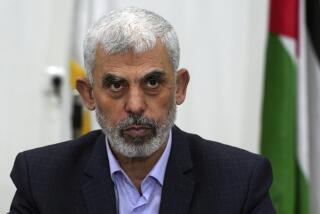Former U.N. Envoy Likely to Be Likud’s New Leader : Israel: Benjamin Netanyahu is the front-runner in contest that will put party in hands of a new generation.
- Share via
TEL AVIV — Benjamin Netanyahu, Israel’s former ambassador to the United Nations and its voice on American television during the Gulf War, emerged Monday as the front-runner to take over the leadership of the Likud Party, which was defeated in parliamentary elections last summer.
Netanyahu, 43, deputy prime minister in the former government of Yitzhak Shamir, won support from 77% of Likud’s 3,500-member central committee for an internal party election to choose its new chairman--and its candidate for prime minister in the next national election in 1996.
A second Netanyahu proposal, approved by 85% of central committee members, requires the winner to get only 40% of votes cast for the chairmanship, rather than more than half, to avoid a runoff--a measure seen as aimed at ensuring his selection as party chairman in March.
Moreover, as part of the changes, the Likud leader will be chosen directly by the right-wing party’s 100,000-plus members, not by power brokers in the central committee, thus broadening political participation in Israel.
“I see in this a personal expression of trust,” Netanyahu said as the votes were tallied in an all-night session here. “I thought I was a minority opinion in the party. . . . I am very happy, and before me stands four months of campaigning to assure my victory in the elections for Likud chairman.”
Counterproposals by Zeev Benjamin Begin, 49, son of the late Prime Minister Menachem Begin and Netanyahu’s chief rival for the party chairmanship, failed to pass. “These are the results, these are the numbers and I accept them,” Begin said while expressing chagrin over the way Netanyahu’s high-powered campaign had overwhelmed him. “It has become clear that there are two approaches to democracy.”
Meanwhile, Ariel Sharon, 64, the former defense and housing minister, withdrew his candidacy for the chairmanship. That left David Levy, 54, a former foreign minister, as the only other likely contender. Shamir, 77, the current chairman, announced after the party’s election defeat that he would retire as soon as a successor was chosen.
The contest among Netanyahu, Begin and Levy for the party chairmanship will bring the passage of Likud leadership from its founders to a new generation, but one still committed to the “Greater Israel” philosophy that characterized both the Begin and Shamir governments.
A Gallup opinion poll this month showed Netanyahu favored by 67.5% of all voters to lead Likud; Levy was next, favored by 6.6%.
Netanyahu, regarded even by his sharpest critics as a political dynamo, hopes to revitalize Likud, then to begin work on bringing down the government of Prime Minister Yitzhak Rabin. He hopes to force early elections by exploiting cracks within Rabin’s center-left coalition and by hammering away relentlessly on security issues. Likud took only 32 seats in the June elections against the 44 won by the Labor Party, and Israeli political commentators believe that its comeback will be long and arduous.
Netanyahu, who mastered the technique of getting across his point sharply in television sound bites while at the United Nations, is introducing a media-oriented style of campaigning into Israeli politics that Labor may find hard to match. He also believes the rejuvenation of Likud’s leadership will assist in its comeback campaign.
But Netanyahu, known as “Bibi,” also has many critics, who describe him as so totally driven that even his supporters find it difficult to work with him.
In a blistering attack published on the eve of the Likud meeting, Zeev Chafets, an Israeli columnist and former government spokesman under former Prime Minister Menachem Begin, wrote, “Israel has always had its share of ambitious politics, but there has never been anyone so publicly, nakedly ambitious as Netanyahu.” The article in Jerusalem Report, a biweekly Israeli newsmagazine sold largely in the United States, appeared to be an effort to cut off the extensive flow of campaign money from American Jews to Netanyahu.
More to Read
Sign up for Essential California
The most important California stories and recommendations in your inbox every morning.
You may occasionally receive promotional content from the Los Angeles Times.










